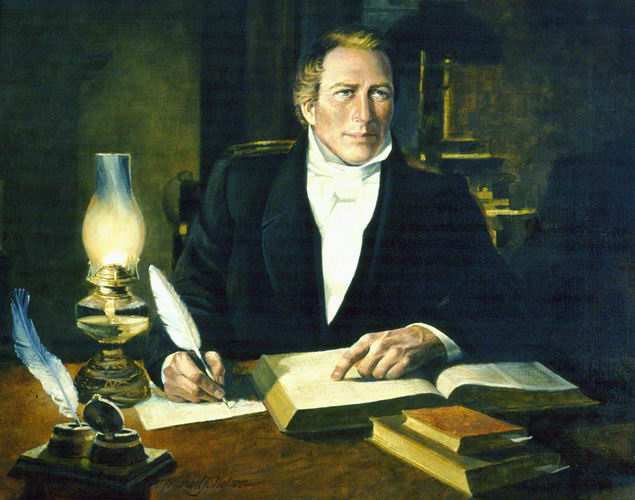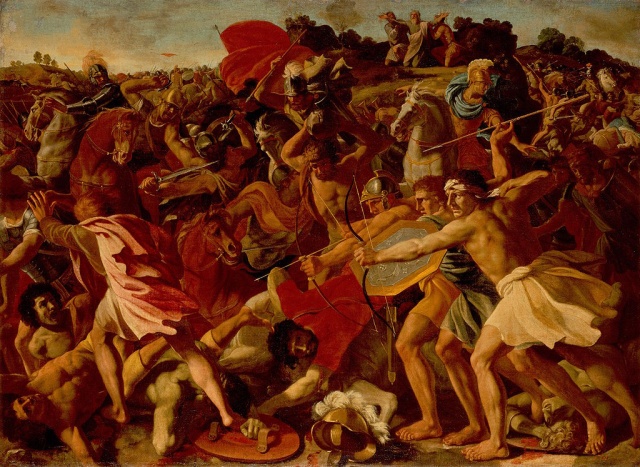Question
Dear Gramps,
About two weeks ago I sent you a message concerning Zechariah 12:10. I received an answer from you with your arguments concerning this verse and some others concerning the use of various Bible translations. In my answer I put forward my arguments – and, I think, well-grounded ones – discussing this question. In my message I offered you a simple comparison of Psalm 110 in the King James Version and in the American Standard Version, accompanying it with a question: “Who is the Lord telling the Lord to sit at his right hand?” (see also Psalm 2) True, I myself answered it in my message. However, I would like to know your opinion and I have been waiting for your answer for over a week since.
Best regards,
Tigran
Answer
Dear Tigran,
The Bible was not written in English. In all probability it was originally written in Egyptian hieroglyphics (but that is another story). Various Bibles use various terminologies to express the translator’s concept of the intent of the original writing (more about this later). So it is very hazardous to place specific interpretations on particular words, as you appear to be doing in your interpretation of Zechariah 12:10. You have somehow taken the two words, LORD and Lord, to mean the same thing. These two words are translations of two different Hebrew words that have very distinct meanings. The King James translation uses the term, LORD, for the Hebrew word, Yhovah, derived from hayah, which means “to be” or “to exist”, the English translation of which is Jehovah, meaning “the existing One”. The term, Yhovah, was so sacred to the Jews that is was not to be pronounced or written. It was traditionally identified only through a tetragrammaton, four Hebrew letters variously represented in our alphabet as IHVH, JHVH, JHWH, YHVH, YHWH. The term, Jehovah, is found in the King James version of the Old Testament only four times. All other places where the term Jehovah was represented in the Hebrew, the King James translators used the term LORD–all capitals. So, whenever you see the term LORD in the Old Testament you may translate it as Jehovah. The term, Lord (with only the first letter capitalized), in the King James version is translated from the Hebrew word, ‘adown, which has various forms in English, including the terms firm, strong, lord and master. So you may very correctly translate Psalms 110:1, given in the King James version by The LORD said unto my Lord, Sit thou at my right hand, until I make thine enemies thy footstool, as “Jehovah said unto my master, Sit thou at my right hand…” This problem of translation is one of the reasons why there is an Article of Faith in the Mormon Church that says,
We believe the Bible to be the word of God as far as it is translated correctly; we also believe the Book of Mormon to be the word of God.
Since in modern Bibles we are dealing with translation upon translation (the King James version being the result of 13 different translations and versions from the original), there may be significant differences between the original version and the modern versions of the scriptures. So how is one to know what the true meaning of any of the Bible verses may be? The answer is found in 1 Cor. 2:11
For what man knoweth the things of a man, save the spirit of man which is in him? even so the things of God knoweth no man, but the Spirit of God
That verse itself is erroneously translated from the original. The Prophet Joseph Smith, under Divine Inspiration, made a corrected translation of the Bible. This verse in the Joseph Smith Translation reads
For what man knoweth the things of a man, save the spirit of man which is in him? even so the things of God knoweth no man, except he has the Spirit of God.
If you were to interpret the King James verse as literally have you have been interpreting the scriptures under discussion, that verse would mean that the things of God are known by only one, they are known only by the Spirit of God. Thus, according to this scripture, man cannot know the things of God. It is immediately obvious that this not a correct statement. Therefore, there must be something faulting in the King James translation. Looking at the Joseph Smith translation of the same verse there is no such logical inconsistency. The verse is straight forward and clear of meaning. We are to understand by that scripture that no one can know the things of God (and our understanding of the things of God comes from the Holy Scriptures) if he does not have within him the Spirit of God. A marked evidence that this is true is found in the multiple interpretations of the same scripture by the supposed theologians of our day. Witness the fact that there are about 650 different Christian denominations in the United States alone, all with different theologies, yet all believing in the same Bible. Now back to the process of translation– The object of translating from one language to another is first to understand the meaning of the words to be translated, then to express them in an understandable way in the new language. Unless under the direct inspiration of God, two different people translating the same scripture will use their own familiar terminology and their own unique understandings; and where the words of the two translators are different the meanings will also be different to one degree or another. As an example, here is a passage from Isaiah that is also found in the Dead Sea Scrolls, and the translation of that passage from the Dead Sea Scrolls by two different translators: The King James version of Isaiah 5:11-14—
Woe unto them that rise up early in the morning, that they may follow strong drink; that continue until night, till wine inflame them!
And the harp, and the viol, the tabret, and pipe, and wine, are in their feasts: but they regard not the work of the LORD, neither consider the operation of his hands.
Therefore my people are gone into captivity, because they have no knowledge: and their honourable men are famished, and their multitude dried up with thirst.
Therefore hell hath enlarged herself, and opened her mouth without measure: and their glory, and their multitude, and their pomp, and he that rejoiceth, shall descend into it.
The translation by Gassler—
Woe unto them that arise early, to go chasing after strong drink, that stay late in the cool of the evening, while wine lights fires within them!Those carousals of theirs are but rounds of strumming and drumming, of hooting and tooting–and wine. Quite oblivious they are to what the LORD is about, too blinded ever to see what He is actually doing. That is the reason why My people, likewise unconscious, have likewise been ‘carried away’–away to an alien land, their gentry starving for hunger, their masses parched for thirst. That too is the reason why it is Hell that now stretches its gorge, and Hell that now holds its mouth limitlessly agape, while down does all their proud show, all their racket and riot, and all that made merry therein. (Theodore Gassler, The Dead Sea Scriptures, Garden City, NY: Doubleday, pp 230-231, 164)
The translation by Vermes—
Woe to those who rise early in the morning to run after strong drink, to those who liger in the evening until wine inflames them. They have zither and harp and timbrel and flute and wine at their feasts, but they do not regard the work of the Lord or see the deeds of His hand. Therefore my people go into exile for want of Knowledge, and their noblemen die of hunger and their multitude is parched with thirst. Therefore my people go into exile for want of Knowledge, and their noblemen die of hunger and their multitude is parched with thirst. Therefore Hell has widened its gullet and opened it mouth beyond measure, and the nobility of Jerusalem and their multitude go down, her tumult and he who rejoices in her. (Geza Vermes, The Dead Sea Scrolls in English, Penguin Book Ltd. Harmondsworth, Middlesex, England: p. 227, 1962)
It is immediately apparent from the above three translations of the same passage that many differences exist that could easily lead to different interpretations of the same original scripture. So you may see how necessary it is to be under the influence of the Spirit of God in order to obtain an understanding of the meaning of the scriptures. To be under the influence of the Holy Spirit one must live a pure life, as spoken by the Prophet Mosiah in the Book of Mormon—
And now, I say unto you, my brethren, that after ye have known and have been taught all these things, if ye should transgress and go contrary to that which has been spoken, that ye do withdraw yourselves from the Spirit of the Lord, that it may have no place in you to guide you in wisdom’s paths that ye may be blessed, prospered, and preserved–
I say unto you, that the man that doeth this, the same cometh out in open rebellion against God; therefore he listeth to obey the evil spirit, and becometh an enemy to all righteousness; therefore, the Lord has no place in him, for he dwelleth not in unholy temples. (Mosiah 2:36-37)
And one must also pray to the Father that he may receive a portion of the Holy Spirit to enlighten his understanding,
Pray always, and I will pour out my Spirit upon you, and great shall be your blessing–yea, even more than if you should obtain treasures of earth and corruptibleness to the extent thereof (D&C 19:38).
Gramps







